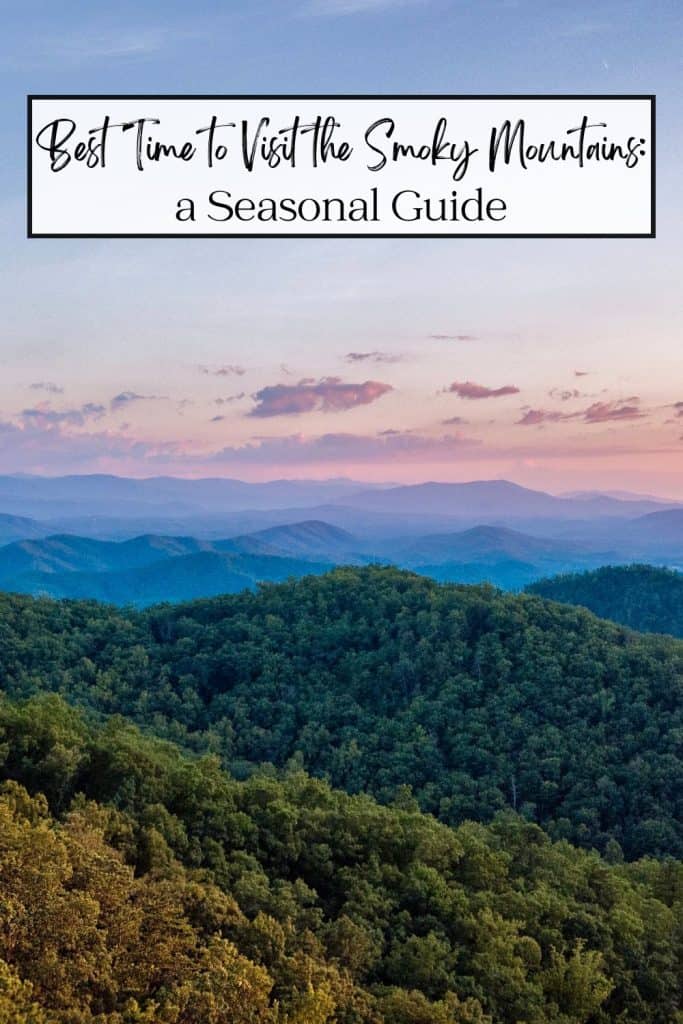Best Time to Visit the Smoky Mountains: a Seasonal Guide

WONDERING WHEN TO PLAN YOUR TRIP TO THE SMOKY MOUNTAINS? HERE’S WHAT I TELL MY TRAVEL CLIENTS!
As someone who’s lived in Tennessee for over 20 years and plans custom vacations across the South, I get asked this question all the time: “When’s the best time to visit the Smoky Mountains?” Truth is, there’s no one-size-fits-all answer, but there is a perfect time depending on what kind of experience you’re looking for.
Whether you’re dreaming of crisp fall hikes with mountain views, quiet winter mornings in a cozy cabin, or bringing the kids for some summer fun in Pigeon Forge, this guide will walk you through what each season has to offer.
In this post, you’ll find:
- Seasonal breakdowns of weather, activities, and tips for visiting
- A quick comparison of what to expect in each season
- Travel recommendations based on your trip style and interests
Not sure which season fits your travel style? Let’s break it all down so you can plan a trip that feels just right.
Spring in the Smoky Mountains (March-May)
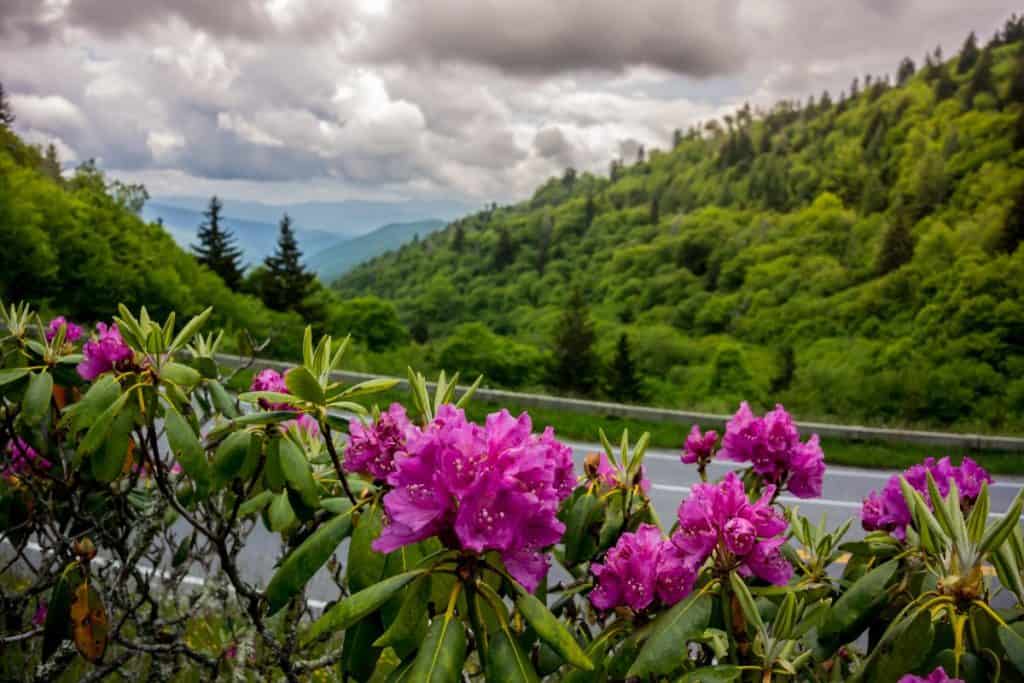
Spring is one of my favorite times to visit the Smokies. Everything starts waking up! Dogwoods bloom, waterfalls roar, and the mountain air just feels fresh and full of possibility. It’s also a great season if you want fewer crowds than summer but still want to enjoy the outdoors.
Weather and Conditions
Early spring can still be a little chilly, especially in the higher elevations, but things warm up quickly. March is unpredictable (you might see snow one week and sunshine the next), but by April and May, temps usually settle into a comfortable range. Think 50s to 70s. You’ll want to pack layers and be ready for spring showers, but it’s worth it for those vibrant green views.
Best Activities in Spring
Hiking and wildflower spotting – The Smokies are known as the “Wildflower National Park,” and for good reason. Trails like Porters Creek and Little River burst into color starting in April.
Scenic drives – Cades Cove is stunning this time of year with wild turkeys, black bears waking up, and fresh greenery all around.
TRAVELISTA TIP: If you plan to visit Cades Cove, make sure you carve out enough time! My family can easily spend the entire day driving the scenic loop, taking pictures, and stopping to look at the historic sites.
Waterfall chasing – Spring rains mean the waterfalls are at their best! Don’t miss Laurel Falls or Abrams Falls if you’re up for a moderate hike.
Tips for Visiting in Spring
If you’re aiming for peak wildflower season and mild weather, plan your trip for mid- to late April. This is when the colors really pop and the temperatures are just right for long hikes or scenic drives. Just be sure to pack a rain jacket—spring showers are common, especially in March and early April, but they usually don’t last all day.
If you’re traveling around Easter weekend or during spring break, book your stay early since those dates tend to fill up fast in popular towns like Gatlinburg and Pigeon Forge.
Summer in the Smoky Mountains (June-August)
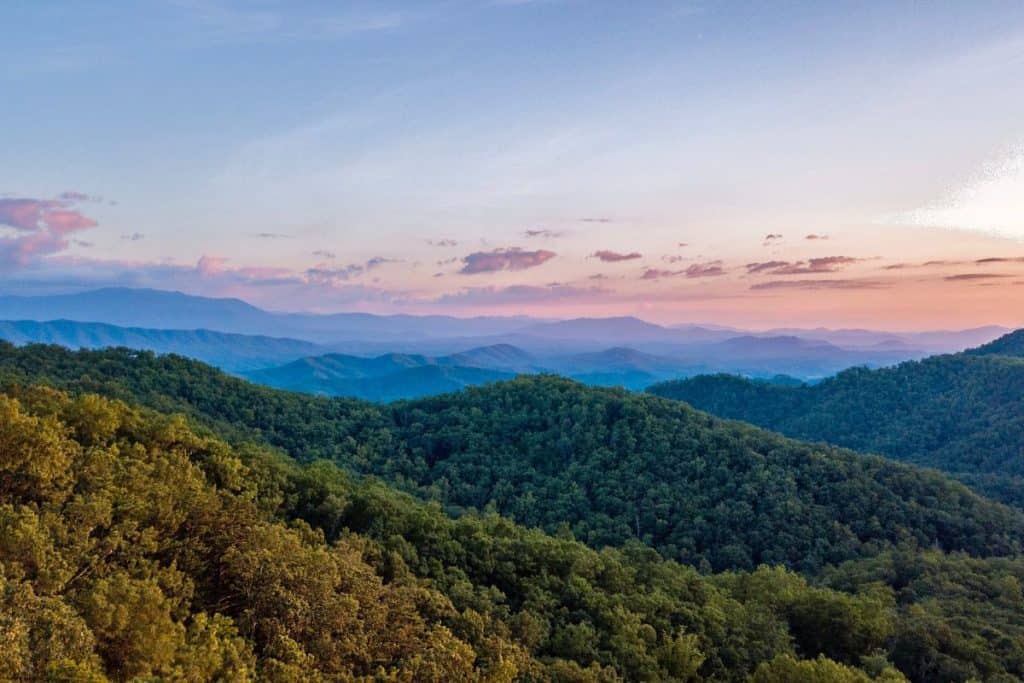
If you’re looking for long, sunny days and a full lineup of outdoor fun, summer is your season in the Smokies. Everything’s open—visitor centers, hiking trails, tubing spots, and family-friendly attractions in nearby towns like Gatlinburg and Pigeon Forge. It’s the most popular time of year to visit, and for good reason: the mountains are lush, the waterfalls are flowing, and there’s no shortage of things to do.
Weather and Conditions
Summer in the Smokies means warm temps, high humidity, and the occasional afternoon thunderstorm. Daytime highs usually range from the upper 70s to mid-80s in the valleys, but it stays cooler up in the higher elevations. It’s a great time to hike early in the morning, then cool off in a mountain stream or take a drive up to a breezy overlook.
Best Activities in Summer
Tubing and swimming – Townsend is a popular spot for river tubing, especially on a hot day.
Early morning hiking – Hit the trails before the heat sets in. Try Alum Cave or Andrews Bald for cooler temps and stunning views.
Family adventures – With Dollywood, mountain coasters, mini golf, and more, there’s no shortage of kid-friendly fun.
Firefly viewing – If you time it right in early June, the synchronous fireflies in Elkmont are a once-in-a-lifetime experience.
TRAVELISTA TIP: The fireflies can be viewed for about 2 weeks every year. It has become so popular that the National Park often holds a lottery to let guests in to see it. If this is something you want to do, plan ahead!
Tips for Visiting in Summer
Summer is the busiest season in the Smokies, so it pays to plan ahead. Try to start your hikes early—both to beat the heat and the crowds. Pack plenty of water, sunscreen, and snacks for any outdoor adventures.
Lodging fills up quickly in July especially, so book well in advance if you’re planning a family vacation. And don’t forget to check the forecast each day—afternoon storms can roll in fast, but they usually pass just as quickly.
TRAVELISTA TIP: Summer is the perfect time for a scenic drive through the Smokies! You must try this Self-Guided Tour through the Smoky Mountains that also includes Cades Cove. It is packed with unique stories and lots of history to really give you a great overview of the area!
Fall in the Smoky Mountains (September-Mid-November)

Fall can also be an extremely popular time to visit the Smokies, and once you see it, you’ll understand why. The entire landscape turns into a painting with bright reds, golden yellows, and fiery oranges stretching across the mountains. It’s an ideal season for hikes, scenic drives, cabin getaways, and cozy evenings by the fire. If you’re looking for crisp air and unforgettable views, this is your time.
Weather and Conditions
September still holds onto a bit of summer warmth, especially early in the month, but by October, things start to cool down in the best way. Highs usually stay in the 60s and 70s, with chilly mornings and evenings—perfect for flannel and campfires. Rain is less frequent in fall, and the skies tend to be clear and bright, making it ideal for long-range views.
Best Activities in Fall
Leaf peeping – The Smoky Mountains are one of the best places in the country to see fall foliage. Some of the most scenic spots include Clingmans Dome, Newfound Gap Road, and the Roaring Fork Motor Nature Trail.
Hiking – Trails like the Alum Cave Bluffs or Gregory Bald are absolutely stunning when framed by fall color.
Festivals and local events – Nearby towns like Gatlinburg and Sevierville host seasonal events, craft fairs, and harvest festivals throughout the fall.
TRAVELISTA TIP: Harvest Festival at Dollywood runs for most of September and October and is a must do if you are in Pigeon Forge for the fall!
Tips for Visiting in Fall
If you’re hoping to catch peak color, mid to late October is usually your best bet—though it varies slightly depending on elevation. The higher elevations change first, with color creeping lower as the weeks go on. Fall is also one of the busiest times in the park, so expect traffic and book your accommodations as early as possible. Sunrise hikes or early scenic drives are a great way to beat the crowds and soak in those fall views while everything’s still quiet.
Winter in the Smoky Mountains (Mid-November-February)

If you’re craving peace and quiet, winter in the Smokies might surprise you in the best way. The crowds thin out, the air turns crisp, and the mountains take on a whole new kind of beauty. Think snow-dusted peaks, bare trees that open up new views, and cozy evenings in front of the fireplace. It’s a great time for a relaxing getaway, especially if you’re not looking to do the traditional tourist thing.
Weather and Conditions
Winter weather in the Smokies can be a bit of a mixed bag. Lower elevations (like Gatlinburg and Pigeon Forge) tend to stay cold but not snowy, with highs in the 40s and 50s. Higher elevations, like Newfound Gap or Clingmans Dome, are where you’ll see snow and icy conditions. Some roads and trails may close temporarily. Always check the park’s official site for weather alerts and road closures before heading out.
TRAVELISTA TIP: If you are booking a cabin for a winter in the Smokies vacation, make sure with the owner that the cabin is accessible during winter weather! You don’t want to get stuck trying to get there… or get home!
Best Activities in Winter
Scenic drives – If roads are open, winter views from places like Foothills Parkway or Newfound Gap are stunning and way less crowded than in peak seasons.
Cozy cabin stays – This is the season for slow mornings, fire pits, and hot cocoa with a mountain view.
Winter hiking – Some trails stay accessible in winter, like Laurel Falls or Porters Creek. Just make sure to wear good boots and check for ice!
TRAVELISTA TIP: If you want a little touch of holiday magic during your time in the Smokies, you have to book this Smoky Mountain Holiday Light Spectular! It is a relaxing (and warm!) way to see the holiday lights of Gatlinburg.
Tips for Visiting in Winter
If you’re visiting in winter, flexibility is key. Weather can change quickly, and certain roads may close with little notice—especially after snowfall. That said, winter is also when you’ll find the best lodging deals and a more peaceful experience overall.
Pack warm layers, sturdy shoes, and maybe even some microspikes if you plan to hit the trails. And don’t skip the scenic drives! Those quiet winter overlooks are some of the best-kept secrets in the park.
Smoky Mountains Seasons at a Glance
Trying to decide when to go? Each season in the Smoky Mountains has its own kind of magic. Here’s a quick side-by-side look to help you compare the pros and cons and figure out which time of year fits your trip best.
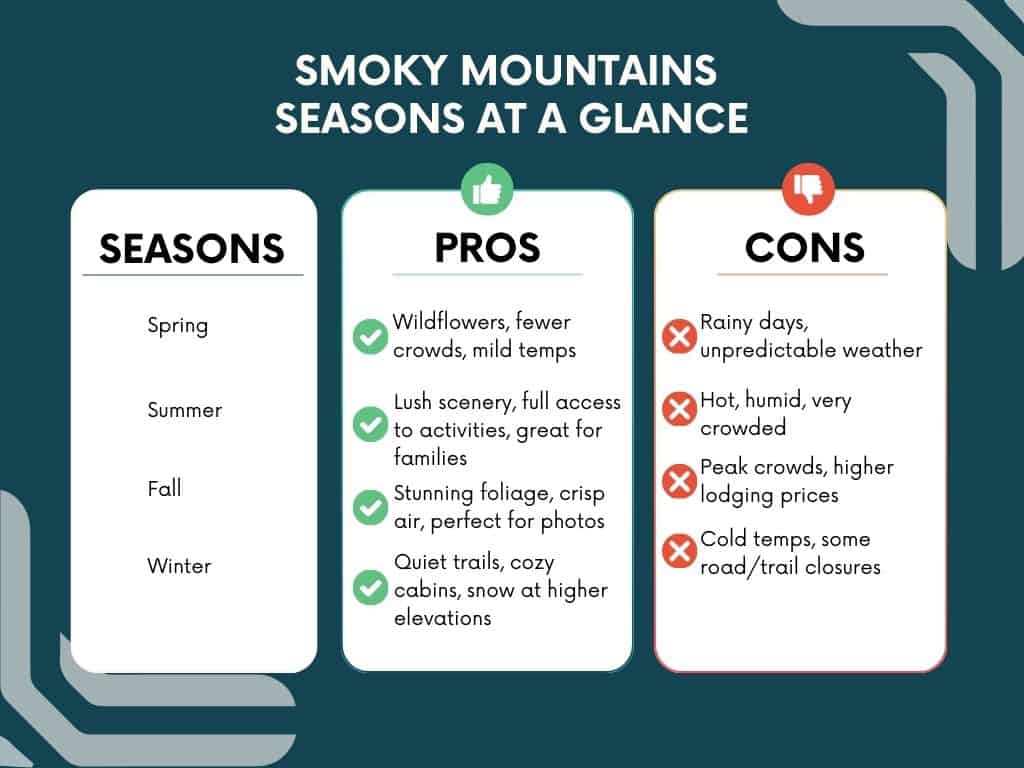
No matter when you go, there’s really no wrong season to visit the Smokies—it just depends on what kind of experience you’re after. This table should help you zero in on the vibe that’s right for you.
Click to Follow Me on Social Media for More Travel Inspiration!
Best Times to Visit by Travel Style

Not every traveler is looking for the same kind of trip, and that’s one of the best things about the Smoky Mountains. Whether you’re planning an adventurous hike, a peaceful retreat, or a fun family vacation, here’s when to go based on your travel style.
For Outdoor Adventurers and Hikers
If you’re all about hitting the trails, spring and fall are ideal. Spring brings blooming wildflowers and cool temps, while fall offers crisp air and unbeatable views framed in fall color. Both seasons are perfect for long hikes without the summer heat or winter closures.
For Families with Kids
Summer is your best bet. Everything’s open, the days are long, and there’s plenty to do—think tubing, mini golf, Dollywood, wildlife spotting, and endless ice cream stops. Just plan ahead and hit the busy spots early in the day.
TRAVELISTA TIP: Looking for a fun, unique excursion with the kids? Try the Moonshine Mountain Coaster! They are the first to do it in Gatlinburg and are great for all ages!
For Couples or Romantic Getaways
Fall is an obvious favorite, with cozy cabin stays and breathtaking mountain views. But winter is seriously underrated with fewer crowds, better deals, and just the right amount of quiet if you’re looking to reconnect and slow down.
For Nature Photographers
Spring and fall are both goldmines for photo ops. Spring offers wildflower fields, misty mornings, and rushing waterfalls, while fall brings that famous foliage and golden-hour glow. Winter can also be stunning if you’re after peaceful, snow-dusted landscapes.
For Travelers Who Prefer Fewer Crowds
Winter is your best friend here. Visit in January or February for the most peaceful trails, easy-going drives, and deeply discounted stays. Early spring (before mid-March) is another sweet spot if you’re not into the hustle and bustle.
Best Towns for Visiting the Smoky Mountains
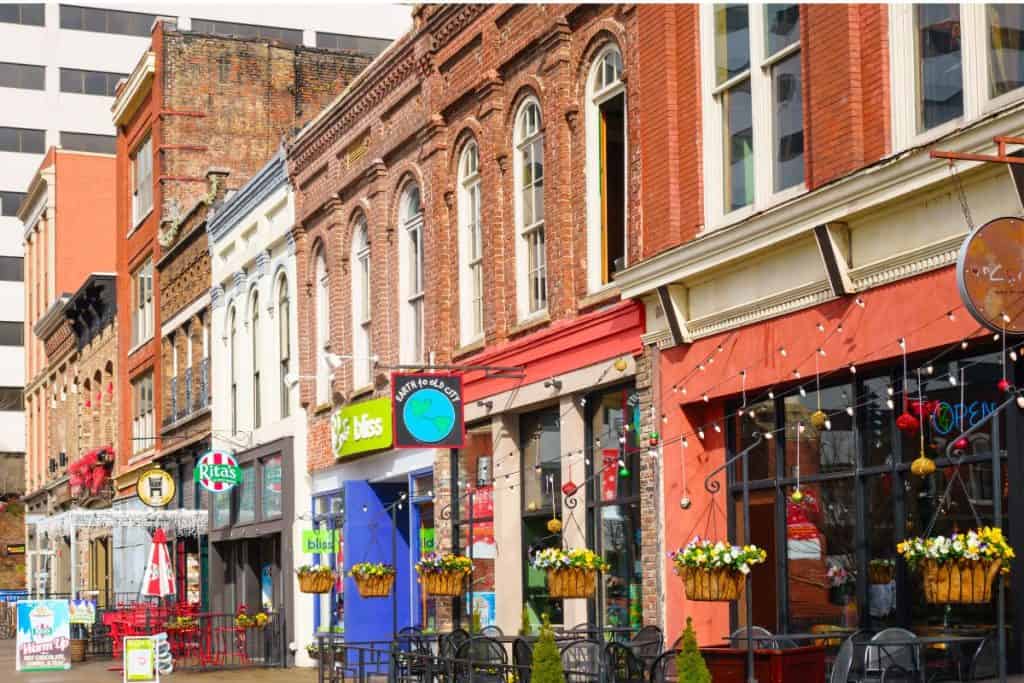
No matter when you decide the best time to visit the Smoky Mountains is for your trip, picking the right town to stay in can make a big difference in your overall experience. Each area around the park has its own unique feel. Some are lively and packed with attractions, while others are calm, scenic, and tucked away in nature. Here are the best towns to consider based on how you like to travel.
Gatlinburg, TN
Gatlinburg is a top pick for first-timers who want to be right in the middle of it all. It’s the closest town to the main entrance of Great Smoky Mountains National Park and puts you minutes away from scenic drives, popular trailheads, and the Sugarlands Visitor Center. If you’re visiting during peak seasons like fall or summer, expect crowds—but also tons of convenience.
TRAVELISTA TIP: A fun way to check out the city of Gatlinburg is to do this Groovy Gatlinburg Scavenger Hunt! It is a 2 hour self-guided tour all done through your phone. You will get to see some unique landmarks while learning about the city!
Pigeon Forge, TN
Just a few miles from the park, Pigeon Forge is perfect for families, especially if you’re visiting during summer break. It’s full of attractions like Dollywood, dinner shows, go-karts, and mini golf, making it a great option if you want to mix nature with entertainment. It’s busiest in June and July, so plan ahead.
Townsend, TN
For those looking to experience the best time to visit the Smoky Mountains in peace and quiet, Townsend is a hidden gem. This small town is known as the “peaceful side of the Smokies” and gives you easy access to Cades Cove without the heavy traffic of the main gateways. It’s a beautiful choice in spring and fall when the natural scenery is at its best.
Sevierville, TN
If you’re looking for more affordable lodging while still staying close to the park, Sevierville is a solid option. It’s a bit farther out but has plenty of restaurants, shops, and roomy cabins. It’s a great base for any season, especially if you’re visiting during a busy time and want to save a little on accommodations.
TRAVELISTA TIP: Looking for a totally out-of-the-box way to experience the mountains? This Zipline Tour will give you just that! It will have you soaring through the trees with a birds eye view of the Smokies.
Cherokee, NC
Located on the North Carolina side of the park, Cherokee offers a quieter and more cultural take on the Smoky Mountains. This area is ideal if you’re visiting during late spring or early fall when crowds are lighter and the views along the Blue Ridge Parkway are stunning. You’ll also find access to unique trails and waterfalls you won’t see on the Tennessee side.
What to Pack for a Trip to the Smoky Mountains
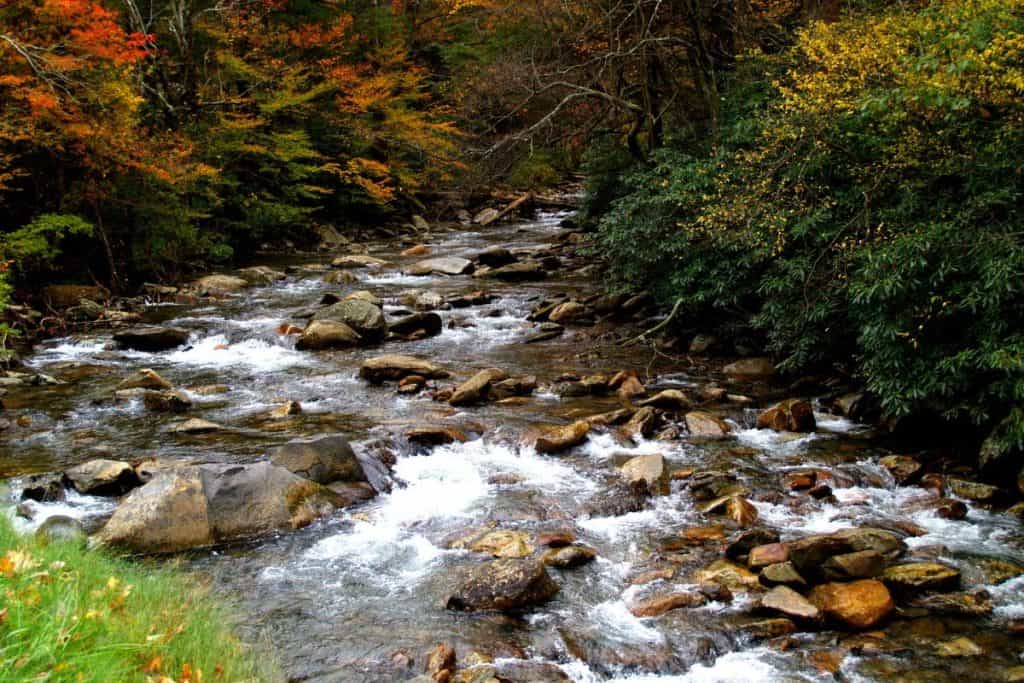
Packing for a trip to the Smoky Mountains depends a lot on when you go. Since the best time to visit the Smoky Mountains varies from person to person, your packing list should match the season. Here’s what I recommend bringing, no matter when you’re headed to the mountains.
Year-Round Essentials
- Comfortable walking shoes or hiking boots – Even if you don’t plan to hike, you’ll likely do more walking than you expect.
- Layered clothing – Weather can change fast in the Smokies, especially as you change elevation.
- Rain jacket or poncho – Especially important in spring and summer when pop-up showers are common.
- Reusable water bottle and trail snacks – Hydration is key for both hikes and long scenic drives.
- Park map or offline GPS app – Cell service can be spotty inside the park.
Extras by Season
- Spring – Light fleece jacket, waterproof hiking shoes, allergy meds if you’re sensitive to pollen.
- Summer – Sunscreen, insect repellent, breathable clothing, sandals or water shoes for river fun.
- Fall – Warm layers for chilly mornings, gloves and a beanie if you’re out at sunrise, camera for foliage!
- Winter – Thermal layers, insulated boots, microspikes for icy trails, and a cozy blanket for scenic overlooks.
No matter when you decide the best time to visit the Smoky Mountains is for you, having the right gear makes all the difference. A little preparation goes a long way in making your trip more comfortable and stress-free.
Planning Your Trip to the Smoky Mountains
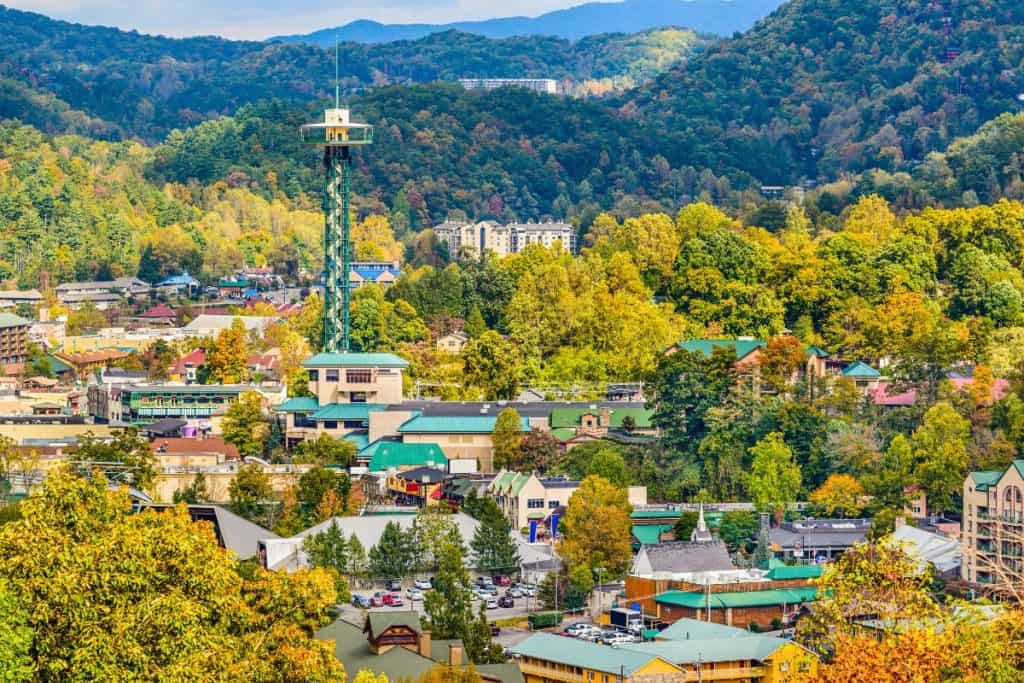
If you’re still unsure when the best time to visit the Smoky Mountains is for your trip, that’s exactly what I’m here for. I offer custom itinerary planning services that take the guesswork out of your vacation. Whether you’re traveling with kids, planning a romantic getaway, or just want to soak up the beauty of the mountains without stressing over the details—I’ve got you.
Once we figure out your ideal travel dates, I’ll create a personalized Smoky Mountains itinerary tailored to your style, budget, and must-see list. I don’t handle bookings, but I’ll point you to the best places to stay, eat, hike, and explore—so all you have to do is pack your bags and enjoy.
Ready to plan your perfect Smoky Mountains trip? Click the button below to get started!
Final Thoughts: Best Time to Visit the Smoky Mountains
The truth is, the best time to visit the Smoky Mountains really depends on what kind of trip you’re hoping to have. Spring brings wildflowers and quiet trails, summer is full of family fun, fall shows off the park’s most iconic colors, and winter gives you peace and scenic beauty without the crowds.
No matter when you decide to go, the Smokies never disappoint. I hope this guide helped you feel more confident about picking the right time for your adventure. And hey, if you’d rather not plan it all yourself, I’d love to help you build a custom itinerary that fits your style perfectly.
See you in the mountains!

Pin It For Later!
